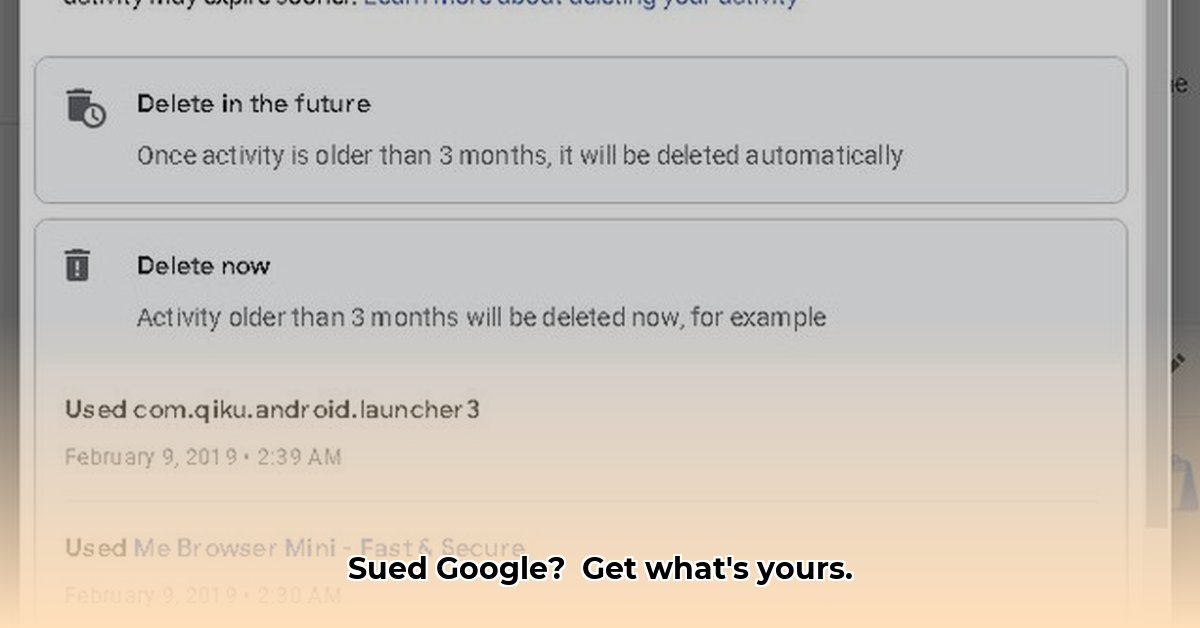This guide provides a comprehensive overview of the Rodriguez v. Google LLC lawsuit, often referred to as the “Google Web & App Activity Lawsuit.” We’ll cover key aspects of the case, including who’s affected, important dates, potential outcomes, and how to manage your Google privacy settings.
Understanding the Lawsuit
This lawsuit alleges that Google collected data from apps outside of Google’s own family, even when users had disabled the “Web & App Activity” and/or “Supplemental Web & App Activity” settings in their Google accounts. This allegedly occurred between July 1, 2016, and September 23, 2024, through tools called the Firebase SDK and/or Google Mobile Ads SDK. Essentially, the lawsuit claims Google may have found ways to collect data even when users explicitly instructed them not to. Google denies any wrongdoing, likely arguing they operated within the bounds of their terms of service.
Who is Affected?
This lawsuit doesn’t affect every Google user. It primarily focuses on individuals who had their app activity collected despite disabling specific privacy settings between July 1, 2016, and September 23, 2024. This includes users of apps incorporating the Firebase or Google Mobile Ads SDKs. The lawsuit presents two distinct claims:
-
Violation of California’s Comprehensive Computer Data Access and Fraud Act (CDAFA): This claim applies to most eligible users regardless of their device type.
-
Invasion of Privacy/Intrusion upon Seclusion: This claim excludes Enterprise and supervised accounts for users under 13.
Key Dates and Deadlines
Staying updated on key dates is crucial. While the official opt-out deadline has passed (January 6, 2025), other important dates, such as the final approval hearing, are still pending. It’s vital to consult the official settlement website for the most up-to-date information.
| Action | Date/Status |
|---|---|
| Exclusion (Opt-Out) | Passed (January 6, 2025) |
| Claim Filing | To be announced |
| Final Approval Hearing | To be announced |
What Can You Do?
While the opt-out deadline has passed, managing your Google privacy settings is crucial.
Managing Your Google Privacy
-
Access Settings: Log into your Google account and navigate to “Data & privacy.”
-
Web & App Activity: Control Google’s recording of your searches, website visits, and app use.
-
Other Privacy Settings: Explore and adjust settings for ad personalization, location history, and YouTube history.
| Setting | Description |
|---|---|
| Web & App Activity | Controls Google’s recording of your online activity. |
| Ad Personalization | Tailors ads based on your activity and interests. |
| Location History | Tracks your location. |
| YouTube History | Keeps a record of videos you watch. |
Potential Outcomes and Broader Implications
The trial, scheduled for August 2025, could significantly impact how Google handles user data. A plaintiff victory might lead to financial compensation and changes in Google’s data practices, though there’s no guarantee. This case highlights the ongoing tension between data collection and user privacy, prompting critical questions about the effectiveness of privacy settings and the level of control users truly possess.
This lawsuit also reflects broader concerns about online privacy in the digital age. Some argue that current privacy regulations are insufficient, while others suggest users bear greater responsibility for understanding their data footprint. Ongoing research continues to explore these complexities.
The Bigger Picture: Data Privacy in the Digital Age
The Rodriguez v. Google LLC lawsuit raises fundamental questions about the balance between personalized digital experiences and the right to privacy. It underscores the importance of transparency and user control over personal data. How much are we willing to trade for the convenience of personalized services? This case serves as a reminder that the conversation surrounding data privacy is far from over.
Disclaimer: This information is for educational purposes only and is not legal advice. Consult with a qualified legal professional for advice tailored to your situation.
- Windows App to Stop Apps Running in Background Saves Battery - February 2, 2026
- How To Spot Android Apps Running In The Background - February 1, 2026
- Android App to Stop Background Apps and Save Battery - January 31, 2026










